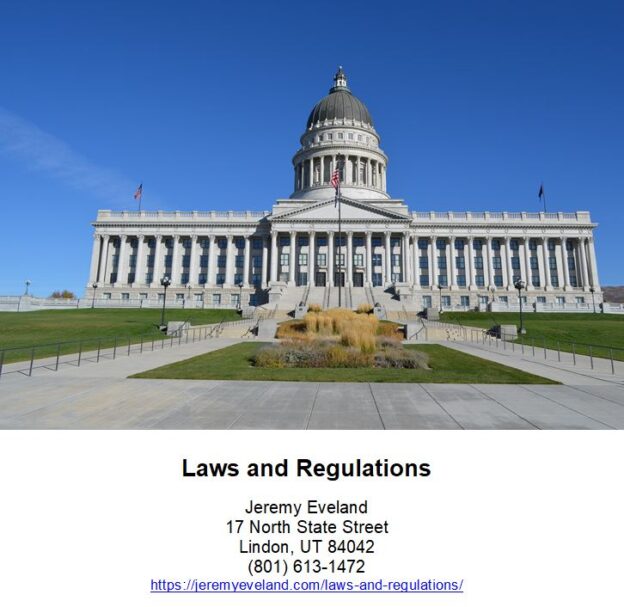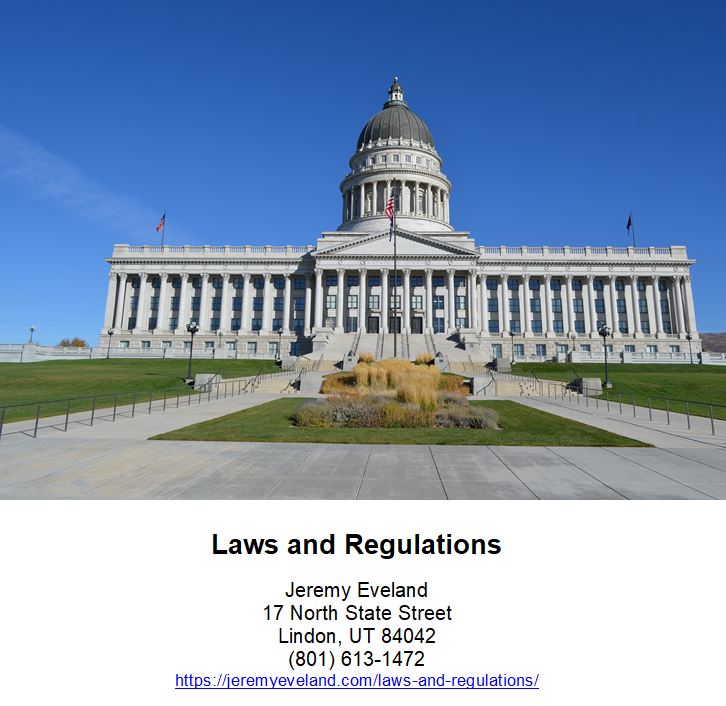If you’re considering venturing into the energy and utilities industry in Utah, it’s crucial to equip yourself with the necessary knowledge and expertise to ensure success. Starting and running a business in this sector can be complex, but with the right strategies and guidance, you can thrive in this competitive landscape. In this article, we will explore valuable tips that will help you navigate the intricacies of establishing and managing a successful energy and utilities business in Utah. From understanding regulatory frameworks to implementing effective marketing strategies, these insights will empower you to make informed decisions and position your business for growth and prosperity.

Choosing the Right Legal Structure
Determining Business Type
When starting an energy and utilities business in Utah, one of the first decisions you must make is determining the type of legal structure your business will take. The legal structure you choose will have a significant impact on how your business operates, its liability, taxation, and more. It is crucial to carefully consider the specific needs and goals of your business before making this decision.
Understanding Business Structures
Before choosing a legal structure, it is essential to have a clear understanding of the various options available. The most common business structures are sole proprietorship, partnership, limited liability company (LLC), and S corporation. Each structure has its own set of advantages and disadvantages, so it is crucial to weigh the pros and cons to make an informed decision.
Pros and Cons of Sole Proprietorship
A sole proprietorship is the simplest type of business structure and is most suitable for startups or small businesses. As the sole owner, you have complete control over the business and its profits. However, you are also personally liable for any debts or legal obligations incurred by the business. Additionally, the sole proprietorship does not provide the same level of credibility and limited liability protections as other structures.
Benefits and Drawbacks of Partnership
If you are starting a business with one or more partners, a partnership structure may be more suitable. Partnerships come in two forms: general partnerships and limited partnerships. In a general partnership, all partners share the profits and losses equally, while in a limited partnership, there are general partners who assume liability and limited partners who have limited liability. However, partnerships also have the drawback of unlimited personal liability.
Advantages and Disadvantages of LLC
A limited liability company (LLC) offers the benefits of both a corporation and a partnership. It provides limited liability protection, meaning that the owners’ personal assets are generally protected from business debts and liabilities. Additionally, LLCs have flexibility in taxation options and less complex regulations compared to corporations. However, forming an LLC requires more paperwork and expenses than a sole proprietorship or partnership.
Considering S Corporation
An S corporation is a type of corporation that elects to pass corporate income, losses, deductions, and credits through to its shareholders for federal tax purposes. This structure combines the limited liability protection of a corporation with the tax benefits of a partnership. However, S corporations have strict eligibility requirements and limitations on the number of shareholders and types of shareholders.
Factors to Consider When Choosing
When choosing a legal structure for your energy and utilities business in Utah, it is essential to consider several factors. These include your business goals and objectives, the level of personal liability you are willing to assume, the desired tax treatment, operational requirements, and the potential for future growth and expansion. Consulting with an experienced business lawyer can help you make an informed decision based on your specific circumstances.
Consulting with an Experienced Business Lawyer
Choosing the right legal structure for your energy and utilities business is a critical decision that can impact your business’s success and your personal liability. It is recommended to consult with an experienced business lawyer who can guide you through the process and provide personalized advice based on your specific needs. A business lawyer will ensure that you comply with all legal requirements and help you make informed decisions that align with your long-term business goals.
Obtaining Necessary Licenses and Permits
Researching State and Federal Requirements
Before starting your energy and utilities business in Utah, it is essential to research and understand the state and federal requirements for licensing and permits. Different types of energy and utilities businesses may have specific licensing and permitting requirements, and it is crucial to comply with all applicable regulations to avoid legal issues and penalties.
Understanding Local Regulations
In addition to state and federal requirements, it is important to consider local regulations when obtaining licenses and permits for your energy and utilities business. Local jurisdictions may have additional requirements or restrictions that you need to be aware of. It is advisable to consult with local government authorities or a business lawyer to ensure compliance with all relevant regulations.
Identifying Specific Licenses and Permits
Depending on the nature of your energy and utilities business, you may need to obtain specific licenses and permits. This could include licenses for energy generation, distribution, or retail, permits for water rights or waste disposal, environmental permits, and various industry-specific certifications. Identifying the specific licenses and permits required for your business is crucial to ensure legal operation.
Application Process for Energy and Utilities Business
Once you have determined the necessary licenses and permits for your energy and utilities business, you will need to understand the application process. This typically involves completing application forms, providing supporting documentation, paying fees, and undergoing inspections or reviews. It is important to carefully follow the application process and meet all requirements to obtain the necessary licenses and permits.
Securing Environmental Compliance
Energy and utilities businesses often have environmental considerations and regulations that must be addressed. It is crucial to ensure environmental compliance by implementing proper waste management, pollution prevention measures, and sustainable practices. Understanding and complying with environmental regulations will not only help protect the environment but also avoid legal consequences that could harm your business.
Ensuring Compliance with Safety Standards
The energy and utilities industry involves potentially hazardous operations. It is essential to prioritize safety and ensure compliance with safety standards. This includes implementing safety protocols, providing appropriate training to employees, and regularly carrying out safety inspections. By prioritizing safety, you can prevent accidents and injuries, protect your employees, and mitigate potential legal risks.
The Importance of Professional Advice
Navigating the complex landscape of licenses, permits, and regulatory compliance can be overwhelming. Seeking professional advice from a business lawyer with experience in the energy and utilities industry can provide valuable guidance and assistance. A business lawyer will ensure you understand all the legal requirements, help with the application process, and ensure your business operates in full compliance with all necessary licenses, permits, and regulations.
Developing a Comprehensive Business Plan
Defining Business Goals and Objectives
A comprehensive business plan is crucial for the success of your energy and utilities business. It serves as a roadmap, outlining your business goals and objectives. Before diving into the specifics of your business plan, take the time to clearly define what you want to achieve. Are you aiming for rapid growth, long-term sustainability, or a specific market niche? Clearly articulating your goals and objectives will shape the rest of your business plan.
Conducting Market Research
Thorough market research is an essential step in developing a successful business plan. It involves analyzing the energy and utilities industry in Utah, understanding market trends, and identifying potential customers and competitors. This research will provide valuable insights into the demand for your services, market dynamics, and opportunities for growth. Use this information to make informed decisions and tailor your business plan to meet market needs.
Analyzing Competition and Target Market
Understanding your competition and target market is crucial for positioning your energy and utilities business effectively. Analyze the existing competitors in the industry, their services, pricing, and customer base. Identify what sets your business apart from the competition and how you can provide unique value to your target market. By conducting thorough competitive analysis, you can differentiate your business and attract customers effectively.
Determining Service Offerings
Clearly defining your services is essential for your business plan. Determine the specific energy and utilities services you will offer and how they meet the needs of your target market. This may include renewable energy solutions, energy-efficient technology installations, energy audits, or tailored energy management plans. Your service offerings should align with customer demand and differentiate your business.
Creating a Marketing Strategy
A well-developed marketing strategy is integral to the success of your energy and utilities business. Your marketing strategy should outline how you will reach and attract customers, build brand awareness, and generate leads. Consider incorporating online marketing tactics such as search engine optimization (SEO), social media marketing, content marketing, and paid advertising. Tailor your marketing efforts to reach your target market effectively.
Financial Planning and Forecasting
Developing a comprehensive financial plan is essential for the long-term success of your energy and utilities business. This includes estimating startup and operational costs, projecting revenue and expenses, and establishing a budget. Identify potential funding sources and outline your financial goals and targets. It is recommended to seek the assistance of a financial professional to ensure accurate financial planning and forecasting.
Seeking Professional Assistance
Creating a business plan that covers all essential aspects requires expertise and experience. Seeking professional assistance from a business lawyer can provide valuable insights and ensure that your business plan is comprehensive and aligned with legal requirements. A business lawyer can review and provide guidance on the legal aspects of your business plan, such as contracts, intellectual property protection, and compliance with regulations.
Securing Financing for Your Business
Estimating Startup and Operational Costs
Before seeking financing for your energy and utilities business, it is crucial to estimate both the startup and operational costs. Startup costs include expenses such as equipment, licenses, permits, initial inventory, marketing, and professional fees. Operational costs include ongoing expenses such as employee salaries, utilities, maintenance, and marketing. Accurately estimating these costs will help determine the capital needed.
Exploring Funding Options
Once you have estimated the costs, it is time to explore different funding options for your energy and utilities business. There are various options available, such as traditional business loans, government grants and programs, private investors and venture capital, and crowdfunding platforms. Each option has its own requirements, benefits, and considerations. Research and evaluate the best funding options for your business needs.
Traditional Business Loans
Traditional business loans are offered by banks and financial institutions and require collateral and a solid credit history. These loans typically offer competitive interest rates and longer repayment terms. It is advisable to prepare a detailed business plan and financial statements to present to lenders when applying for a business loan.
Government Grants and Programs
Government grants and programs can provide financial assistance for small businesses in the energy and utilities industry. These grants are often aimed at promoting energy efficiency, sustainability, and innovation. Research federal, state, and local government programs that may support your business and determine eligibility criteria and application processes.
Private Investors and Venture Capital
Private investors and venture capital firms can provide funding for your energy and utilities business in exchange for equity or a share of the profits. This option is typically suitable for businesses with high growth potential. Prepare a compelling business proposal and be prepared to pitch your business to potential investors.
Crowdfunding Platforms
Crowdfunding platforms provide opportunities to raise funds from a large number of individuals or investors. This option allows you to present your business idea and attract funding from people who believe in your project. Create a compelling campaign on crowdfunding platforms and offer incentives to attract backers.
Creating a Professional Business Proposal
When seeking financing, it is essential to create a professional business proposal that clearly communicates the value of your energy and utilities business. Include an executive summary, detailed business description, market analysis, financial projections, and an investment plan. A well-crafted business proposal can increase your chances of securing funding.
Preparing Financial Statements
Financial statements, including income statements, balance sheets, and cash flow statements, are essential when seeking financing. These statements provide a snapshot of your business’s financial health and stability. It is recommended to prepare accurate and up-to-date financial statements with the assistance of a financial professional.

Navigating Regulatory and Compliance Requirements
Understanding Energy and Utilities Regulations
The energy and utilities industry is highly regulated to ensure safety, environmental responsibility, and efficient operations. It is crucial to have a comprehensive understanding of energy and utilities regulations at the federal, state, and local levels. Stay updated with any changes or new requirements that may affect your business.
Compliance with Environmental Laws
Environmental regulations play a significant role in the energy and utilities industry. Ensure compliance with environmental laws by implementing measures to minimize pollution, manage waste responsibly, and promote sustainability. Regularly review and update your environmental policies and procedures to align with evolving regulations.
Ensuring Workplace Safety
Maintaining a safe workplace is essential to protect your employees and comply with workplace safety regulations. Implement safety protocols, provide appropriate training, conduct regular safety inspections, and ensure that employees have the necessary personal protective equipment. Stay informed about workplace safety regulations and make continuous improvements to maintain a safe working environment.
Adhering to Industry Standards
The energy and utilities industry has specific industry standards and best practices that should be followed. Adhering to these standards not only ensures compliance but also promotes professionalism and quality in your operations. Stay up to date with industry standards and seek guidance from industry organizations or a business lawyer to ensure compliance.
Navigating Energy Market Regulations
In addition to compliance with environmental and safety regulations, energy and utilities businesses must navigate regulations specific to the energy market. This may include regulations related to energy pricing, transmission, distribution, and renewable energy integration. Stay informed about energy market regulations to ensure compliance and make informed business decisions.
Monitoring Compliance Changes
Regulatory requirements in the energy and utilities industry can change over time. It is crucial to stay informed about any changes in regulations and monitor compliance requirements. Regularly review your business operations, policies, and procedures to ensure ongoing compliance. Seek legal counsel with expertise in energy and utilities regulations to assist you in navigating compliance changes effectively.
Seeking Legal Counsel for Regulatory Support
Navigating regulatory and compliance requirements in the energy and utilities industry can be complex and overwhelming. It is highly recommended to seek legal counsel with expertise in energy and utilities regulations. A business lawyer can provide valuable guidance, ensure compliance with all legal requirements, and represent your business in any regulatory matters.
Building a Competent Team
Defining Roles and Responsibilities
Building a competent team starts with clearly defining the roles and responsibilities within your energy and utilities business. Identify the key functional areas required for your business’s success, such as operations, finance, marketing, and compliance. Clearly define the responsibilities and skills needed for each role to ensure a well-rounded team.
Identifying Key Positions
Identify the key positions that are crucial for the smooth operation of your energy and utilities business. These may include a general manager, operations manager, finance manager, marketing manager, and technicians specialized in various areas of energy and utilities. Prioritize filling these key positions with qualified professionals who can contribute to the success of your business.
Hiring Qualified and Licensed Professionals
When hiring employees for your energy and utilities business, it is crucial to ensure they are qualified and licensed professionals. This is especially important for technical positions that require specialized knowledge and certifications. Conduct thorough interviews and verify qualifications and licenses to ensure you have a competent and qualified team.
Implementing Effective Training Programs
Effective training programs are essential for developing the knowledge and skills of your team members. Develop comprehensive training programs that cover technical aspects, safety protocols, compliance, and industry best practices. Regularly assess the training needs of your team and provide ongoing training to ensure they stay updated with the latest industry developments.
Motivating and Retaining Employees
Motivated and satisfied employees are more likely to contribute to the success of your energy and utilities business. Implement strategies to motivate and retain your employees, such as offering competitive salaries, providing growth opportunities, recognizing achievements, and fostering a positive work environment. Regularly communicate with your team, seek their input, and address any concerns to maintain employee satisfaction.
Creating a Positive Company Culture
A positive company culture plays a vital role in attracting and retaining top talent in the energy and utilities industry. Develop a company culture that promotes teamwork, transparency, open communication, and continuous learning. Foster a safe and supportive environment where employees feel valued and motivated to contribute their best.
Outsourcing When Necessary
Outsourcing certain functions or tasks can be beneficial for your energy and utilities business, especially when specialized expertise is required. Consider outsourcing activities such as legal support, accounting, marketing, or certain technical tasks. Assess the cost-benefit analysis and choose reliable outsourced partners who can contribute to your business’s success.
Implementing Efficient Operations and Technologies
Establishing Standard Operating Procedures
Establishing standard operating procedures (SOPs) is essential for streamlining operations and ensuring consistency within your energy and utilities business. SOPs provide detailed guidelines on how tasks should be performed, ensuring efficiency and reducing the risk of errors. Regularly review and update your SOPs to reflect any process improvements or changes.
Improving Workflow and Productivity
Continuous improvement is essential for optimizing workflow and productivity in your energy and utilities business. Assess your current processes, identify bottlenecks or inefficiencies, and implement solutions to enhance productivity. This may involve automation, reorganizing workflows, or adopting new technologies.
Investing in Energy-Efficient Technologies
As an energy and utilities business, investing in energy-efficient technologies is not only environmentally responsible but can also result in cost savings. Explore and adopt technologies that help reduce energy consumption, increase efficiency, and improve overall operations. This may include energy management systems, smart metering, or renewable energy solutions.
Utilizing Automation and Digital Solutions
Automation and digital solutions can significantly enhance the efficiency and effectiveness of your energy and utilities business. Consider adopting software solutions for tasks such as billing, customer relationship management (CRM), project management, and data analysis. Automation can streamline processes, reduce errors, and free up valuable time for your team to focus on critical tasks.
Maintaining and Upgrading Equipment
Regular maintenance and timely equipment upgrades are crucial for ensuring smooth operations and avoiding unexpected downtime. Develop a comprehensive maintenance plan for your equipment and schedule regular inspections. When necessary, invest in upgrading equipment to take advantage of new technologies or to improve efficiency and reliability.
Monitoring and Analyzing Operational Data
Collecting and analyzing operational data is vital for making informed business decisions and identifying areas for improvement. Implement systems to monitor key performance indicators (KPIs) such as energy consumption, equipment efficiency, customer satisfaction, and financial performance. Utilize data analytics tools to uncover insights and drive data-driven decision-making.
Staying Updated with Latest Innovations
The energy and utilities industry is constantly evolving, with new technologies and innovations emerging regularly. Stay updated with the latest industry trends, advancements, and innovations through industry publications, conferences, and networking events. Adopting innovative solutions can help your business stay competitive and better serve your customers.
Creating a Strong Brand and Marketing Strategy
Defining Unique Value Proposition
To differentiate your energy and utilities business from competitors, it is essential to define a unique value proposition. Identify what sets your business apart and communicate this in a clear and compelling manner. This could be offering renewable energy solutions, exceptional customer service, competitive pricing, or innovative technologies.
Crafting an Engaging Brand Identity
Creating a strong brand identity is crucial for building recognition and trust in the energy and utilities industry. Develop a compelling brand name, logo, and visual identity that reflects your business’s values and resonates with your target market. Consistently apply your brand identity across all marketing materials and customer touchpoints.
Developing a Professional Website
In today’s digital age, a professional website is a must-have for any business. Create a well-designed and user-friendly website that showcases your energy and utilities services, highlights your unique value proposition, and provides essential information to potential customers. Optimize your website for search engines to ensure maximum online visibility.
Expanding Online Presence
In addition to a professional website, expanding your online presence is crucial for reaching a larger audience. Utilize social media platforms such as LinkedIn, Twitter, and Facebook to share industry insights, promote your services, and engage with your target market. Implement a content marketing strategy to provide valuable information and establish your business as a thought leader in the industry.
Implementing Effective SEO Strategies
Search engine optimization (SEO) is essential for improving your online visibility and driving organic traffic to your website. Optimize your website and content using relevant keywords, create high-quality backlinks, and ensure your website is easily navigable. Implementing effective SEO strategies can help increase your website’s ranking in search engine results.
Utilizing Social Media Marketing
Social media marketing is a powerful tool for promoting your energy and utilities business and engaging with your target audience. Develop a social media strategy that aligns with your business goals and target market. Create valuable and shareable content, engage with your followers, and utilize paid advertising options to expand your reach.
Building Strong Industry Relationships
Building relationships with industry professionals and organizations can provide valuable opportunities for collaboration and growth. Attend industry conferences, events, and networking sessions to connect with key stakeholders, such as energy regulators, suppliers, and potential business partners. Actively participate in industry forums and associations to stay connected and informed.
Tracking Marketing Performance
To measure the success of your marketing efforts, it is crucial to track and analyze key marketing metrics. Set specific goals and track metrics such as website traffic, conversion rates, social media engagement, and lead generation. Regularly assess your marketing performance and make adjustments to your strategies and tactics based on data-driven insights.

Ensuring Effective Risk Management
Identifying Potential Risks and Liabilities
Effective risk management starts with identifying potential risks and liabilities that may impact your energy and utilities business. Conduct a thorough risk assessment to identify internal and external risks, such as legal risks, safety hazards, environmental concerns, and operational vulnerabilities. Understanding these risks will allow you to develop targeted risk management strategies.
Developing Risk Mitigation Strategies
Once potential risks have been identified, develop risk mitigation strategies to minimize their impact on your energy and utilities business. This may include implementing safety protocols, creating contingency plans, ensuring legal compliance, and securing appropriate insurance coverage. Regularly review and update your risk mitigation strategies as your business evolves.
Securing Appropriate Insurance Coverage
Insurance coverage is vital for protecting your energy and utilities business from unforeseen events and financial liabilities. Consult with an insurance professional who specializes in the energy and utilities industry to identify the specific insurance policies needed for your business. Common insurance policies for energy and utilities businesses include general liability insurance, property insurance, and workers’ compensation insurance.
Ensuring Legal Protection
Legal protection is crucial for any business, and the energy and utilities industry is no exception. Work with a business lawyer experienced in the energy and utilities sector to ensure that your business is legally protected. This includes having well-drafted contracts, protecting intellectual property, complying with regulations, and addressing any legal issues that may arise.
Implementing Safety Protocols
Prioritizing safety is crucial in the energy and utilities industry, where there are potential hazards and risks. Implement comprehensive safety protocols to protect your employees, customers, and the general public. This may include conducting regular safety training, providing personal protective equipment, and maintaining a safe work environment. Regularly review and update safety protocols to reflect industry best practices.
Maintaining Comprehensive Records
Maintaining comprehensive and organized records is essential for effective risk management. Keep thorough documentation of contracts, licenses, permits, safety inspections, training records, and any incidents or accidents that occur. Comprehensive records will help you demonstrate compliance, track performance, and respond to legal issues effectively.
Consulting with Risk Management Experts
Navigating risk management in the energy and utilities industry can be complex. Consulting with risk management experts who have experience in the industry can provide valuable insights and guidance. They can help you identify potential risks, develop effective risk mitigation strategies, and ensure compliance with legal requirements.
Monitoring Industry Trends and Innovations
Staying Abreast of Legislative Changes
The energy and utilities industry is heavily influenced by legislative changes and regulations. It is crucial to stay updated with any changes in laws or regulations that may affect your business. Regularly monitor industry news, government websites, and consult with legal professionals to ensure compliance with legislative requirements.
Keeping Up with Technology Advancements
Technology advancements have a significant impact on the energy and utilities industry. Stay informed about the latest technological developments, such as renewable energy solutions, energy-efficient technologies, and smart grid advancements. Assess how these advancements can benefit your business and drive innovation.
Exploring Renewable Energy Options
Renewable energy options are gaining increasing prominence in the energy and utilities industry. Explore the possibilities of incorporating renewable energy solutions such as solar, wind, or geothermal power into your business. Conduct feasibility studies to evaluate the potential benefits, costs, and impact on your business operations.
Investing in Sustainability
Sustainability is a growing concern for both businesses and consumers. Incorporating sustainable practices into your energy and utilities business not only helps protect the environment but also enhances your brand reputation. Explore ways to reduce waste, minimize energy consumption, and promote sustainable practices throughout your operations.
Adapting to Changing Consumer Needs
Consumer needs and preferences are continually evolving. Pay attention to changes in consumer behavior, preferences, and demands related to energy and utilities services. Adapt your business offerings, marketing strategies, and customer service to meet changing consumer needs effectively.
Attending Industry Conferences and Events
Industry conferences and events provide an excellent opportunity to stay updated with the latest industry trends, innovations, and advancements. Attend relevant conferences, seminars, and workshops that focus on the energy and utilities industry. Engage with industry professionals, exchange ideas, and foster collaborations to stay ahead of the curve.
Networking with Industry Professionals
Networking plays a crucial role in staying connected within the energy and utilities industry. Join industry organizations, participate in forums, and engage in networking events to build relationships with industry professionals. Networking can provide valuable insights, learning opportunities, and potential business partnerships.
These Frequently Asked Questions cover important aspects of starting and running an energy and utilities business in Utah:
FAQ 1: What legal structure is best for my energy and utilities business in Utah?
Choosing the right legal structure for your energy and utilities business depends on various factors, including your business goals, liability concerns, and tax implications. Consulting with a business lawyer can help you determine the best legal structure based on your specific circumstances.
FAQ 2: How do I obtain the necessary licenses and permits for my energy and utilities business in Utah?
Obtaining the necessary licenses and permits for an energy and utilities business in Utah involves researching state and federal requirements, understanding local regulations, and identifying specific licenses and permits required. It is advisable to consult with local government authorities or a business lawyer to ensure compliance.
FAQ 3: What financing options are available for my energy and utilities business in Utah?
Financing options for an energy and utilities business in Utah include traditional business loans, government grants and programs, private investors and venture capital, and crowdfunding platforms. Each option has its own requirements and considerations, and it is recommended to thoroughly research and evaluate the best funding options for your business.
FAQ 4: How can I navigate regulatory and compliance requirements in the energy and utilities industry in Utah?
Navigating regulatory and compliance requirements in the energy and utilities industry in Utah requires a thorough understanding of energy regulations, environmental laws, workplace safety standards, and industry best practices. Seeking legal counsel with expertise in the energy and utilities industry can provide valuable guidance and support.
FAQ 5: How can I build a competent team for my energy and utilities business in Utah?
Building a competent team for your energy and utilities business involves defining roles and responsibilities, identifying key positions, hiring qualified professionals, implementing effective training programs, motivating and retaining employees, creating a positive company culture, and outsourcing when necessary. Developing a clear recruitment and retention strategy will help you attract and retain top talent in the industry.




